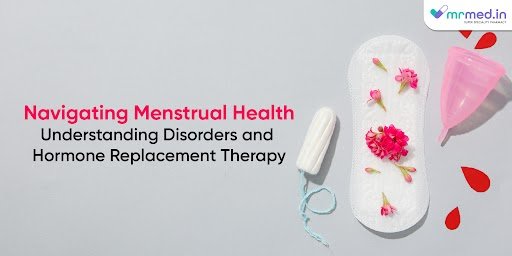Navigating Menstrual Health: Understanding Disorders and Hormone Replacement Therapy
Menstrual disorders are conditions that interfere with a woman's natural menstrual cycle, affecting both her physical and mental well-being. This causes pain, irregular bleeding, and missing periods. They are one of the most common gynecologic disorders affecting women of childbearing age, with a global prevalence ranging from 30 to 70%, and one of the most common reasons women contact physicians worldwide.
Hormone replacement therapy (HRT) indeed can be a valuable treatment option for symptoms of menopause and certain other disorders associated with hormonal changes. In this article, we will delve into common menstrual disorders, the role of hormone replacement therapy, and considerations for navigating these aspects of women's health.
Menstrual Disorders
Menstrual disorders encompass a range of conditions that affect the menstrual cycle's regularity, duration, and intensity. Menstrual abnormalities include but are not limited to amenorrhea, abnormal uterine bleeding (menorrhagia, oligomenorrhea, polymenorrhea, hypomenorrhea), dysmenorrhea, and premenstrual syndrome, which are the most recorded.
Amenorrhea: Absence of monthly periods may be due to primary or secondary causes.
Abnormal Uterine Bleeding (AUB):
AUB may have various causes, some of which are benign. But when AUB is related to changes in hormones that directly affect the menstruation cycle, the condition is called dysfunctional uterine bleeding (DUB). Some of them are:
Menorrhagia: This involves unusually heavy or prolonged menstrual bleeding, which can lead to anemia and interfere with daily activities.
Oligomenorrhea: A type of abnormal mensuration with infrequent periods often due to hormonal imbalances.
Polymenorrhea: These are frequent periods that involve mensural cycles that are shorter and more frequent than usual.
Hypomenorrhea: These are short, scanty periods with substantially light menstrual flow (less than 30ml per cycle).
Dysmenorrhea: Characterized by severe menstrual cramps that can disrupt normal functioning.
Premenstrual Syndrome (PMS) is a combination of physical and emotional symptoms occurring before menstruation, such as bloating, mood swings, and fatigue.
Polycystic Ovary Syndrome (PCOS): It is a hormonal Disorder with enlarged ovaries with small cysts on the outer edges, leading to irregular periods and fertility issues.
Endometriosis is a disorder where tissue identical to the uterine lining grows outside the uterus, resulting in pain and possibly infertility.
Role of HRT:
Hormone replacement therapy involves the use of some synthetic hormones (similar to progesterone and estrogen) to replace for whom the body no longer produces in sufficient quantities. It can be beneficial in managing various menstrual disorders by regulating hormone levels. Here's how HRT can help:
Menopausal Symptoms: HRT is commonly used to reduce symptoms of menopause-- which are hot flashes, vaginal dryness, and mood swings, by replenishing estrogen levels.
Menorrhagia: In cases of excessive menstrual bleeding, hormonal therapy can help regulate menstrual cycle and reduce bleeding intensity.
For example, Certain drugs like Duphaston 10mg Tablet contain an active component called Dydrogesterone (synthetic progestogen). Due to its progesterone-like effects, it helps regulate irregular menstrual cycles and can help treat conditions such as dysfunctional uterine bleeding, premenstrual syndrome, and secondary amenorrhea. It is also used as a hormone replacement therapy in postmenopausal women, particularly when estrogen therapy alone is contraindicated.
Polycystic Ovary Syndrome (PCOS): HRT can be used in the regulation of menstrual cycles in women with PCOS by restoring hormonal balance.
Endometriosis:Hormonal therapy can help manage endometriosis symptoms by suppressing the growth of endometrial tissue outside the uterus.
Things to Consider:
While HRT can be effective in managing menstrual disorders, it's essential to consider potential risks and side effects.
Blood Clotting (Risk of Venous Thromboembolism (VTE)): Estrogen-based HRT might increase the risk of blood clots, especially in women with pre-existing conditions such as obesity or a history of clotting disorders.
Breast Cancer: Prolonged use of combined estrogen and progesterone therapy may slightly increase the risk of breast cancer.
Cardiovascular Health: HRT may affect cardiovascular health, particularly in older women or those with existing heart disease.
Risk of Stroke: HRT tablets (but not patches, gel, or spray) slightly raise the risk of stroke. But the risk is very low, particularly if you are under 60.
While HRT can provide relief for many women, it is essential to weigh the benefits against the potential risks associated with it and make informed decisions in consultation with your healthcare providers.
